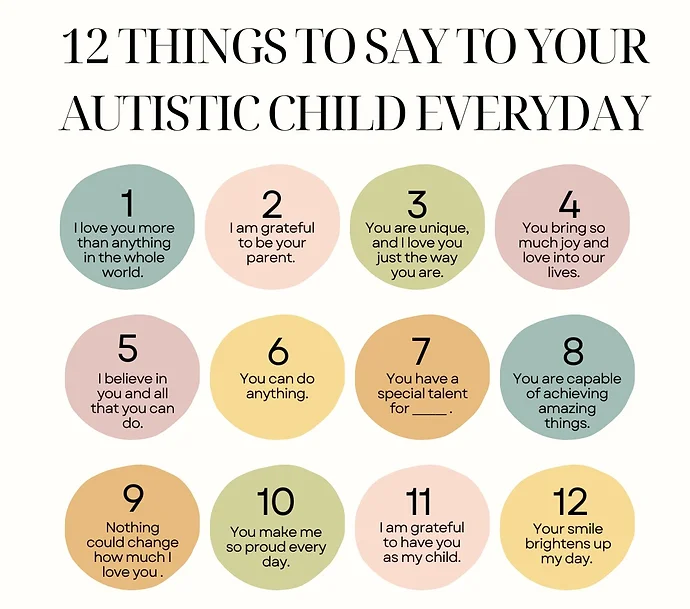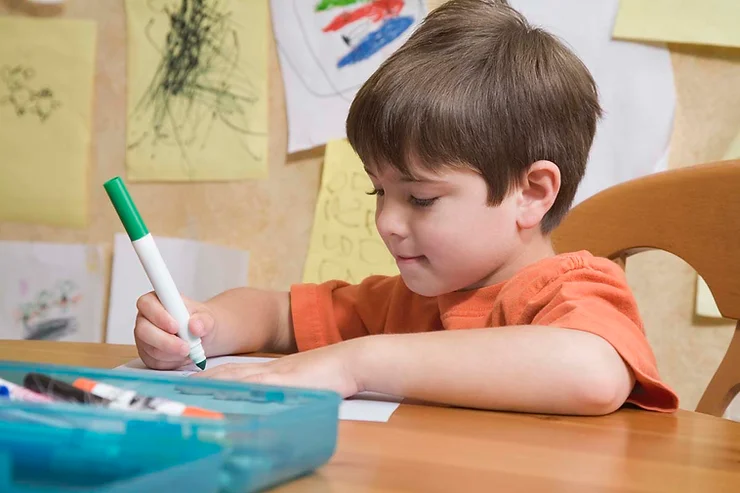Positive Affirmations For Autistic Kids You Need To Know
Discover positive affirmations and activities for autistic kids that will help instill a sense of self-belief, resilience, and optimism!

Every child deserves to feel loved, valued, and empowered, regardless of their unique traits or challenges. For young autistic children, the path to self-confidence and self-acceptance might present more obstacles.
As parents, caregivers, educators, and advocates, it falls upon us to create an environment that fosters their growth and development. We play a vital role in shaping our children’s self-perception and inner dialogue.
One powerful tool in achieving this is the use of positive affirmations. Introducing positive affirmations at an early age provides them with a valuable resource to navigate life’s ups and downs with confidence and optimism.
Together, lets unlock the transformative power of positive affirmations for autistic kids, nurturing their inner strength, resilience, and self-belief. Let’s empower our little ones with the tools they need to navigate the world with confidence and a positive mindset.
Understanding Autism Spectrum Disorder
Before diving into the topic of positive affirmations for autistic kids, it’s essential to have a basic understanding of Autism Spectrum Disorder (ASD).
ASD is a developmental disorder that affects communication, social interaction, and behavior. Every child on the autism spectrum is unique, with their strengths and challenges.
However, one common aspect shared by many autistic children is the need for support and encouragement in building self-confidence and self-esteem.
What Are Positive Affirmations?
Positive affirmations are simple, uplifting statements that can be used to challenge and overcome self-doubt or negative thoughts.
They are phrases that reinforce positive qualities, encourage self-belief, and inspire confidence.
Repeating positive affirmations regularly can help reprogram the subconscious mind, promoting a healthier self-image and mindset.

The Benefits of Positive Affirmations for Autistic Kids
Positive affirmations can be an invaluable tool in supporting the development and well-being of autistic kids. These affirmations offer a range of benefits that contribute to their overall growth and self-confidence.
First and foremost, positive affirmations help build self-confidence and self-esteem. Autistic children often face challenges in social interactions and communication, leading to feelings of self-doubt and inadequacy.
By regularly hearing positive statements about themselves, they begin to believe in their abilities and worth, fostering a stronger sense of self.
Another crucial advantage of using positive affirmations is that they encourage self-expression. Many autistic children struggle to convey their emotions and thoughts, which can lead to frustration and anxiety.
Affirmations provide them with a vocabulary to express their feelings positively, giving them a sense of control over their emotions and promoting healthy communication.
Furthermore, positive affirmations nurture a growth mindset in young autistic kids. A growth mindset emphasizes the belief that abilities can be developed through dedication and hard work.
By emphasizing effort, persistence, and growth through affirmations, children are more likely to embrace challenges and see failures as opportunities for learning and improvement.
Beyond the individual benefits, positive affirmations also contribute to enhancing social skills in autistic kids. These affirmations can reinforce positive social behaviors, such as sharing, taking turns, and empathizing with others.
By consistently acknowledging and praising these behaviors, autistic children feel more comfortable in social situations, ultimately boosting their confidence and encouraging further positive interactions with peers.
Related: Building Strong Self-Esteem in Autistic Children: A Parent’s Guide
Positive Affirmation Activities
1. Morning Affirmation Ritual
Start the day with a positive affirmation activity by creating a morning ritual with your kids. Gather together and take turns sharing affirmations about yourselves and each other.
Encourage your children to express positive qualities they appreciate about themselves, such as “I am kind,” “I am smart,” or “I am creative.”
This activity promotes self-confidence, self-love, and sets a positive tone for the day ahead.
2. Positive Affirmation Coloring Books
These special coloring books incorporate uplifting messages and affirmations into the illustrations.
By providing their children with these coloring books and coloring materials, parents encourage creativity and reflection.
As children color the pages, they can also read and internalize the positive affirmations, fostering positive self-talk and self-expression.
This activity offers a calming and enjoyable experience while reinforcing positive beliefs and creating a bonding opportunity for parents and children to share.
3. Affirmation Art
Engage in a fun and creative activity with your kids by making affirmation art together. Provide them with art supplies such as paper, markers, crayons, and stickers.
Take the lead by writing or drawing positive affirmations that resonate with your children. Encourage them to do the same, expressing their creativity while reinforcing positive self-talk.
Together, you can create colorful posters or personal affirmation cards to decorate their rooms or share with loved ones.
This activity not only allows children to explore their artistic abilities, but also instills the power of positive affirmations in their lives.

4. Affirmation Jar
Foster a supportive and uplifting atmosphere within your family by creating an affirmation jar. Find a jar or container and get creative with colorful paper, stickers, or ribbons to decorate it.
Sit down with your children and invite them to write down positive affirmations on small strips of paper. Encourage them to include affirmations not just about themselves, but also about their family members.
Place all the affirmations in the jar and take turns drawing one each day or whenever someone needs a boost of positivity.
This activity allows you as parents to guide your children in affirming their strengths and fostering a sense of love and support among family members.
5. Affirmation Storytime
Incorporate affirmations into storytime by choosing books that emphasize positive messages and self-esteem.
Look for children’s books that feature characters facing challenges and overcoming them with positive affirmations and self-belief.
After reading the story, have a discussion with your children about the positive lessons learned and encourage them to share their own affirmations related to the story’s theme.
This activity combines storytelling, imagination, and positive affirmations to inspire and empower children.
Related: 10 Of The Best Children’s Books About Autism
6. Bedtime Affirmation Routine
Establish a bedtime routine that includes affirmations. Before your children go to sleep, gather together and have a moment to reflect on the day.
Encourage each family member to share one positive experience or accomplishment from the day and affirm it with encouraging words.
For example, “I am proud of myself for helping a friend today, and I am a kind person.”
This activity helps children focus on the positive aspects of their day and promotes a peaceful and positive mindset before bedtime.
Related: What are the 5 Neurodivergent Love Languages?

Tips for Using Positive Affirmations with Autistic Kids
Tip # 1 Be Genuine and Specific
Offer specific compliments and acknowledgments that are sincere and meaningful. Focus on their efforts, strengths, and achievements.
For example, instead of saying, “You’re a great artist,” you can say, “I love how you used different colors to create that beautiful picture. You’re so creative!”
Tip # 2 Use Daily Affirmations
Introduce daily affirmations as part of your child’s routine. Help them start their day on a positive note by saying affirmations together.
For example, you can say, “Today is going to be a great day. I am confident and ready to tackle any challenges that come my way.”
Tip # 3 Encourage Self-Affirmations
Teach your child to develop their own positive self-talk by encouraging them to create their own affirmations.
Guide them to come up with positive statements about themselves and their abilities.
For instance, ask them, “What do you think is something great about yourself?” or “What are you proud of achieving today?”
Tip # 4 Be a Role Model
Model positive self-talk and affirmations yourself. Let your child witness you using positive language about yourself and others.
This demonstrates the power of affirmations and encourages them to adopt the practice as well.
Tip # 5 Make It Fun and Creative
Incorporate affirmations into playful activities.
Write affirmations on colorful sticky notes and place them in your child’s room or lunchbox.
Create affirmation cards or posters together and decorate them.
Make it an enjoyable and interactive experience.
Tip # 6 Reinforce Effort and Progress
Emphasize the importance of effort and growth.
Praise your child’s progress, perseverance, and resilience.
Encourage them to see setbacks as opportunities for learning and growth.
Tip # 7 Be Present and Attentive
Give your child your undivided attention when they share their achievements, concerns, or ideas.
Actively listen and respond with positive and supportive language.
This fosters a sense of validation and importance.
Tip # 8 Consistency is Key
Regularly incorporate affirmations into daily routines, such as morning rituals or bedtime routines.
Repetition helps reinforce positive beliefs, and over time, they will internalize these positive messages and develop a strong and confident mindset.

45 Positive Affirmations to Say to Your Autistic Child
1. I love you more than anything in the whole world.
2. I am grateful to be your parent.
3. You are beautiful.
4. You are such a kind-hearted person.
5. You make me so proud every day.
6. Your smile brightens up my day.
7. I believe in you and all that you can do.
8. You are unique, and I love you just the way you are.
9. You can do anything.
10. You are capable of achieving amazing things.
11. Your thoughts and feelings are important, and I am here to listen.
12. You have a brilliant mind that sees the world in a beautiful way.
13. Your determination and resilience inspire me every day.
14. You are worthy of love, respect, and kindness.
15. I believe in you and your ability to overcome challenges.
16. Your voice matters, and I value what you have to say.
17. You have a special talent for (insert their special interest or skill).
18. You are very creative.
19. I love seeing what you create.
20. You are strong and capable of handling whatever comes your way.
21. You are surrounded by people who care for you deeply.
22. Your joy and happiness brighten up our lives.
23. I am proud of you and all that you have accomplished.
24. You are a kind and caring person who makes a difference in this world.
25. I love your honesty.
26. You are an important part of our family.
27. Your uniqueness is a gift.
28. You enrich our lives in countless ways.
29. I admire your curiosity and thirst for knowledge.
30. You are becoming more confident with each passing day.
31. You are a problem solver, and I know you can figure things out.
32. Your perspective is valuable.
33. I enjoy learning from you.
34. You have the strength to ask for help when you need it.
35. You are deserving of kindness and understanding from others.
36. Your dreams are worthy of pursuit.
37. You are important, and your presence makes the world a better place.
38. You have a unique and beautiful way of seeing the world.
39. Your honesty and directness are qualities to be admired.
40. You are loved unconditionally.
41. You are incredibly creative and imaginative.
42. Your hard work and effort are paying off.
43. I appreciate the way you always try your best.
44. You have a wonderful sense of humor.
45. You are a great problem solver.
Final Thoughts
Positive affirmations for autistic kids have the potential to transform young lives by instilling a sense of self-belief, resilience, and optimism.
When integrated into their daily routine, affirmations can become a powerful tool to navigate life’s challenges with confidence.
As parents, caregivers, and educators, let us harness the power of positive affirmations to empower and uplift these young minds, helping them flourish and reach their full potential.
Together, we can create a world where every child feels valued and cherished, regardless of their unique abilities.






